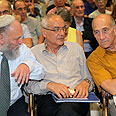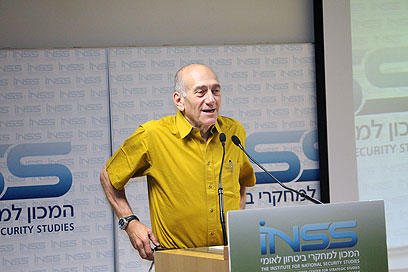
Olmert: I have no intention of going into politics
Two days after being acquitted on most of the criminal charges against him, former prime minister says he has 'no intention' of resuming political activity and that the Second Lebanon War was caused by failures of the IDF command to carry out government orders
Six years to the day after the Second Lebanon War broke out, former prime minister Ehud Olmert spoke at a Tel Aviv conference devoted to the war and perceptions of security hosted by the Institute for National Security Studies.
Olmert, who was acquitted this week on most of the criminal charges against him, said Thursday that he wanted to calm down "anyone who is worried – I have no intention of entering politics."
Related stories:
- Op-ed: Olmert deserves second chance
- Op-ed: A new era in Lebanon?
- 'Next Lebanon war will be different'
Turning to the Second Lebanon War, Olmert said that "the defense minister had acted in a way that was calculating, considered, and impressive to prevent mistakes by the Northern Command. The war broke out because of a failure at the command level to carry out orders from the state."

Olmert speaking at Thursday's Conference (Photo: Moti Kimchi)
Olmert said that many people had advised him that the response was appropriate. "After it happened, the same people said we should pause and think. We prepared for this scenario for six months and what our response would be," the former PM said, referring to Defense Minister Ehud Barak.
Continuing, Olmert said that when there had been "events" in the South, the "same people" had advised him to wait a month to take action in the North. "They said that the moment a missile hit Ashdod – we must take immediate action. That instant. 'Wow,' I said. 'These are the same people who told me that the North had to wait.' But things change when you change roles."
Olmert also brushed off criticism about appointing an IAF commander chief of staff. "Who says that the ability to know and act in synchronicity is greater among ground forces commanders than air force pilots?" he asked, attacking the "established, dogmatic perception that the right way to fight a war is when 1,000 tanks advance and enter enemy territory and conquer land and take over cities and all that, so a ground forces commander knows better."
"The best man is the one who knows best how to synchronize all the aspects of modern war," he said.
He identified with angry remarks by former IDF Chief of Staff Dan Halutz over rumors that he told the cabinet "only from the air."
"He told the cabinet that this wouldn't be a knock-out. All the ministers knew it," Olmert said, adding that he had led the war from the perspective that military force was necessary to spark "international intervention that would change the reality."
Halutz also took part in the conference and addressed his opening remarks to Olmert. "I want to congratulate the former prime minister on the results of his trial," the former chief of staff said.
"People always ask if the country's strategic balance has improved since 2006, but in my view that's not relevant. It's nonsense to isolate the Second Lebanon War and say that it was the opposite of the (current) situation. Egypt has changed, Syria, Libya, Iraq – we have (also) changed," he said.
Halutz admitted that in the war "there had been mistakes, and we continue to make mistakes. The policy of keeping pressure on Hezbollah since withdrawing from Lebanon was correct. At the end of the day, we manage risk, not successes. Risk management is managing our day-to-day, and the withdrawal was the right thing, but the subsequent policy wasn't."
"We said that when the first rocket fell, we would shake up Lebanon. But we shook ourselves up. Hezbollah is a result of 1982 – we got rid of Fatah and got Hezbollah in its place."
The former chief of staff said that prior to the Second Lebanon War, operational programs had not been perfect: "IDF drills weren't held regularly for years," he noted.
He also said that an air force commander, no matter how talented, as IDF chief of staff could not take into account all these things. "But I'm not denying that it was at my door," he said. "The shift in consciousness… to another kind of warfare didn't happen at the right pace, not on the national level and not on the military level. The emergency reserves draft didn't happen on time, the internal IDF dialogue wasn't good enough, the language wasn't clear or sharp enough," he said.
Olmert vs. Barak
Olmert also expressed hinted criticism of Defense Minister Ehud Barak and his decision to purchase a sixth dolphin submarine from Germany for almost NIS 2 billion.
"The future battleground will be inside our cities and not in some remote front," Olmert said. "That is because the means cannot be changed. We need to know how to properly allocate our resources and not spend billions on unnecessary things," he added.
"But there are army people here whom I'm sure raised more than one eyebrow upon hearing about supposedly strategic purchases which are a pure waste of money which could have been spent on Israel's critical needs."
Olmert was referring to Israel's "strategic arm" – the dolphin submarine fleet which foreign reports claim can carry nuclear missile warheads and serve as a second strike weapon.
- Receive Ynetnews updates directly to your desktop










